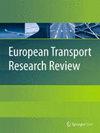Georeferenced X (formerly twitter) data as a proxy of mobility behaviour: case study of Norway
IF 4.2
3区 工程技术
Q1 TRANSPORTATION
引用次数: 0
Abstract
Georeferenced messages on social media represent a powerful data source to gain a different perspective for estimating mobility behaviour, which is still mainly based on travel surveys. These data are openly available, yet few studies have explored their potential. This paper assesses the feasibility of large-scale Twitter data as a proxy of human mobility behaviour to complement traditional travel surveys, and for calibration and validation of transport models. Almost 12 million Tweets from more than 90,000 users were further analysed to detect the trip patterns at municipality level in Norway from 2012 to 2022. Results showed that the mobility patterns changed between 2014 and 2019 for the travel survey, as for 2019 most of the reported trips were short and concentrated in the densely populated areas of the country, where most respondents lived, triggering a lack of information for certain areas. In contrast, Twitter data presented a more stable data source along both years with similar population distribution and average trip length. Although Twitter data have limitations in relation to the socio-demographic information of the users, it could complement the travel survey given the broader spatial and temporal distribution of this large-scale data.以地理参照 X(原 twitter)数据为代表的流动行为:挪威案例研究
社交媒体上的地理参照信息是一个强大的数据源,可从不同角度估算流动行为,而目前的估算仍主要基于出行调查。这些数据可以公开获取,但很少有研究对其潜力进行探索。本文评估了将大规模推特数据作为人类移动行为代理的可行性,以补充传统的出行调查,并校准和验证交通模型。本文进一步分析了来自9万多名用户的近1200万条推文,以检测2012年至2022年挪威市镇一级的出行模式。结果显示,2014 年至 2019 年期间,旅行调查的流动模式发生了变化,因为 2019 年报告的大多数旅行时间较短,且集中在全国人口稠密地区,大多数受访者居住在这些地区,从而导致某些地区的信息缺乏。相比之下,推特数据在这两年都提供了较为稳定的数据源,其人口分布和平均行程长度相似。虽然 Twitter 数据在用户的社会人口信息方面存在局限性,但由于这种大规模数据的空间和时间分布更为广泛,因此可以作为旅行调查的补充。
本文章由计算机程序翻译,如有差异,请以英文原文为准。
求助全文
约1分钟内获得全文
求助全文
来源期刊

European Transport Research Review
Engineering-Mechanical Engineering
CiteScore
8.60
自引率
4.70%
发文量
49
审稿时长
13 weeks
期刊介绍:
European Transport Research Review (ETRR) is a peer-reviewed open access journal publishing original high-quality scholarly research and developments in areas related to transportation science, technologies, policy and practice. Established in 2008 by the European Conference of Transport Research Institutes (ECTRI), the Journal provides researchers and practitioners around the world with an authoritative forum for the dissemination and critical discussion of new ideas and methodologies that originate in, or are of special interest to, the European transport research community. The journal is unique in its field, as it covers all modes of transport and addresses both the engineering and the social science perspective, offering a truly multidisciplinary platform for researchers, practitioners, engineers and policymakers. ETRR is aimed at a readership including researchers, practitioners in the design and operation of transportation systems, and policymakers at the international, national, regional and local levels.
 求助内容:
求助内容: 应助结果提醒方式:
应助结果提醒方式:


